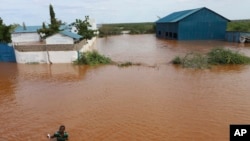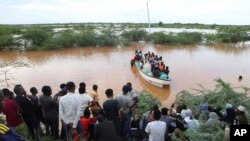The New York-based rights group said the government “has a human rights obligation to prevent foreseeable harm from climate change and extreme weather events and to protect people when a disaster strikes.”
Kenya's Meteorology Department sent an early warning before the rainy season started, but President William Ruto only formed a response committee on April 24. By then, nearly 100 people had died due to the flooding.
Kenya, along with other parts of East Africa, have been overwhelmed by floods. More than 150,000 people are displaced and living in dozens of camps.
The rights group said the government did not draw lessons from the last year's rainy season that left hundreds of people dead.
The meteorology department had warned that the country would experience increased rainfall due to the El Niño until early this year, but Ruto in October said the country had been spared by the weather pattern.
The government announced at the time that at least 10 billion Kenyan shillings ($75 million) would be released to prepare a nationwide response. It is unclear how the funds were used, and critics have accused the government of misappropriation.
Those affected by ongoing flooding in Mai Mahiu, in the west of the country, have accused the government of a slow response. At least 45 people died after a river overflowed and destroyed houses, with more than 80 people missing since Monday. The debris has not yet been cleared to recover any buried bodies.
On Tuesday, the government directed those living in flood-prone areas to move or be evacuated forcefully, as more rain is predicted across the country through May.













Forum